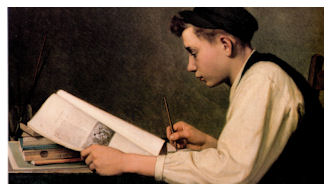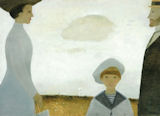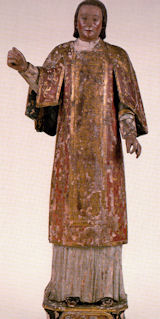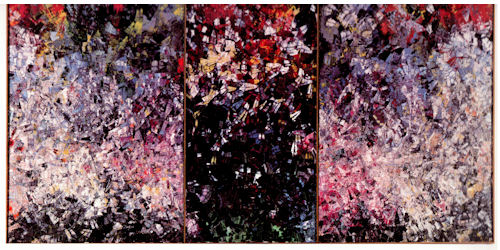




________________________
And now it's necessary to think in English.
La langue que nous utilisons influe sur notre manière
de penser. Bernard
Werber, L'empire des anges, 2000, citation secrète — La Presse, jeudi
20 octobre 2011.
Once upon a time (Il y avais une fois ...) I wanted to translate into English from La Presse some of Stéphane Laporte's memories of his Notre-Dame-de-Grace childhood. Very soon it became obvious that no matter how faithful my efforts, the resulting words would be betrayal rather than homage. I know too much, and everything I know would change to something false those factors of which I know too little.
Many years ago, a reader of The Suburban weekly local paper took it upon himself to challenge and correct every error of fact committed by Mordecai Richler concerning his Saint-Urbain Street childhood. Do those factual errors affect in any way the authenticity of Richler's writings? Of course not. Our childhood memories are the only honest part of ourselves, untinged by irony or other means of self-protection evolved throughout the decades.
Would errors on my part affect any translation of Stéphane Laporte's childhood refusal to wear for one more Halloween his elder sister's discarded fairy costume, and to spend that Halloween at home with his beloved and quietly heroic father? They would, most certainly, thus depriving the reader of the proper enjoyment of Laporte's columns, and, even more importantly, preventing Laporte from being properly understood. Am I saying that Laporte's writings should be read in French, or not at all?
Insofar as concerns those unfathomable columns which deal with recollections of his childhood, I am, yes. These views are undoubtedly influenced by my love for the works of Georges Simenon, early translations of which vary from awful to unreadable. If it is worth braving the intricacies of the passé simple in order to get through the novels of Simenon in the elegant simplicity of his native tongue, Laporte's conversational La Presse columns don't even involve that particular inconvenience.
All of which leads to the two problems preventing translation of these webpages. Apart from my belonging to the Flaubert school of writing — I edit, therefore I am — no French-speaking friend could possibly explain what these webpages mean to an English-speaking reader. Every word, every phrase, refers back to my childhood in Lachine, and the small house lived in by my beloved grandparents, one from Blackpool in Lancashire, and the other from Bradford, in Yorkshire. Their own personal War of the Roses, but happily unaware of the significance of those birthplaces I noticed none of it, and was content.
But nothing prevents me trying to explain in the clearest English possible my intentions in writing these webpages, under construction since 2003. In fact, most of the chapters are already written in other formats (converted from Word Perfect to Front Page Express), and need only be brought into proper Internet form — after editing, re-editing, and more editing, of course.
________________________
Each of us has powerful evocative reactions to certain books, films and television series — our bright particular stars. For a Sandsifter, we see the same bright stars as everyone else, but can find meaning only within ourselves, sifting through the sands of our particular knowledge and experience for clues to help our search for understanding. And understanding almost always means returning for answers to our childhood.
At the beginning of my webpage Definitions, I point out that defining a Masterpiece would be like pinning a butterfly to the wall in order to describe its characteristics. As a result of such interventions, the object under consideration would be no longer a butterfly, but only a dead insect.
Actually, this is not entirely true. It's easy enough to state the main difference between a Masterpiece and a forgettable item of entertainment. The Masterpiece exists in its own time and space, and cannot be compared with other objects of its type, in the same manner that Michaelangelo's David cannot be compared with other sculpture, nor Klimt's The Kiss with examples of similar painting. There is only one Dégas, one La Petite danseuse agée de quatorze ans; there will never be another.
And this website deals with one two-hundred-year-old British Novel by Jane Austen (and reluctant reference to her other Novels), an American television comedy series, an American television science-fiction series, continuing with a British television six-part miniseries, and ending with a small film from Scotland.
I finish Definitions by listing the common characteristics of my five particular choices, explaining why I believe each is a Masterpiece that can be compared not with other objects of its type, but only with entirely different fields.
A 200-year-old English Novel, brought up-to-date every few years by means of film and television miniseries:–
Most filmed versions of Pride and Prejudice bear some resemblance to the Cinderella Fairy Tale. But I've preferred to compare Austen's Novel with Architecture, and the design and construction of one of England's great mansions. And when it comes to Fairy Tales, I have one in mind, and it's not Cinderella.
Seinfeld was an American television comedy series which ran for nine seasons ending in May 1998, still available on a daily basis on basic cable channels.
In this case I've avoided comparison with other television comedies. But why should that matter, when the Charles Schulz Peanuts comic strip, and Snoopy, beloved in French and many other languages and cultures, is in my opinion far more like Seinfeld than any television series?
I've kept the Wikipedia Seinfeld reference in spite of a glaring error in the first paragraph. Except for the first series of only five episodes, and a couple of programmes at the beginning of Series Four ('The Trip'), Seinfeld was indeed filmed in New York City, as is obvious from the sense of purpose clinging to all characters, major and minor, as they set about their activities, while shooting in Los Angeles would have resulted in that well-known desultory air of a city where everyone is waiting to be 'discovered'. But the article also insists on the originality of Seinfeld, and is thus irresistible. (It is said that readers read only to confirm their existing opinions, a phenomenon known as confirmation bias. Mea culpa.)
An American television science fiction series running from September 1966 to June 1969, available daily on specialty cable channels in French and in English, together with an uncountable number of sequels and prequels and outright copies.
A six-episode BBC miniseries from 2005, available so far locally only on BBC Canada, and in the United States on BBC America as Viva Blackpool (in honour of Elvis Presley's Viva Las Vegas, which opens the first episode of the miniseries).
And while Star Trek (Patrouille de cosmos) combines the best of Fairy Tale and Myth, with the former's journeys of discovery and the static certainties of the latter, Blackpool offers a disconcerting collision between the two.
It appears to me that Blackpool would be watched with extreme pleasure by Quebeckers — if it weren't for the fact that the main characters speak in a so-called English that is difficult even for me to understand, not merely the Scottish burr of the Detective Carlisle, but the Blackpool Lancashire accent of Ripley Holden and daughter Shayanne. Their inflected speech should bring back memories of my Lancastrian grandmother, even though she lived here in Canada for the last 45 years of her life. I think that the people of Blackpool don't sound like they did in 1878 when my grandma was born. It ought to be that her speech was altered, but I don't think this is the case. Rather like the recent magnificent TFO transmission of Lully/Molière's comédie-ballet Le Bourgeois Gentilhomme, Film by Martin Fraudreau, said to be an authentic reproduction of speech and song at the French court in the time of the work's creation — with French subtitles for all the lines I'd have understood perfectly even without my copy of the play opened in front of me.
In the meantime I offer a You Tube extract of the opening scenes of the Blackpool miniseries, and Viva Las Vegas:—
Blackpool – Viva Las VegasA 2004/2005 film from Scotland running a mere 110 or so minutes and offering scant competition to its neighbours. If this were a competition, Dear Frankie would find itself in a precarious position. But it isn't. And if the Lancashire speech of Blackpool would cause problems to non-native English speakers, the Scots tongue spoken by every character without exception in Dear Frankie would have been entirely incomprehensible without a helpful printout of the dialogue found on the Internet in 2006.
Dear Frankie. Of course there are other annoying dissatisfying films that linger in the memory, hundreds of them, thousands. But I believe that the art connoisseurs gathered to witness the unveiling of Dégas' sculpture La Petite danseuse agée de quatorze ans would recognize, understand, and sympathize perfectly with the baffled hostility, discontent and frustration of first-time viewers of Dear Frankie. Why can't an artist give us what we want, rather than what he wants?
________________________
But just as I have no explanation why those five particular items have haunted me for years demanding clarification of my thoughts on their particularities, so I have even less explanation for the existence of the following auxiliary webpages:–
Not only is my subject matter entirely of British or American origin, but one of the stipulations in the aforesaid Definitions is that the work in question show an unmistakeable provenance from childhood Fairy Tale or adolescent Myth, which cannot help but create difficulty for a non-English-mother-tongue reader. For without exception my examples are Fairy Tales not as told originally, but through the understanding of a child brought up by grandparents from Northern England.
And when we come to Myth, the names of gods and heroes may be identical throughout Europe and Britain — throughout the entire world, in fact. But can we be certain that the concepts of Myths such as The Labours of Hercules, for example, were understood in the same way in Victorian England, when my Grandma was growing up, as in other countries including their birthplace in Greece?
As mentioned earlier, this section breaks my first rule, that a Masterpiece is unique and mustn't be compared with other objects of its type. But for some inexplicable reason, I find myself obliged to analyse Jane Austen's other Novels for no reason other than to find each unworthy of comparison with that first great work. And unless I deal with the other Novels in a separate webpage, every time I try to work on Pride and Prejudice, it is to find myself under constant obligation to break off all coherent thought by unwanted reference to the other Novels.
Which brings me to the next auxiliary page:–
This is the webpage that French-speaking visitors might find interesting. Enjoyable, probably not. Interesting, yes, perhaps.
________________________
For this webpage's usual left-column quotation it was my intention to use a National Post 'Quote in a Box' (that newspaper's weekend equivalent of the daily La Presse citation secrète) from October 3, 2009 attributed to Albert Camus: —
Nobody realizes that some people expend tremendous energy merely
to be normal.
Except that when I tried to find the relevant citation, and the original text on Google.ca (select French or English), or through wikiquote.org (French), nowhere is it to be found on the Internet in the French language. The phrase appears to exist only in English. How can this be? To be fair, wikiquote.org (English) does mention that 'this quote is from Notebook IV in Notebooks: 1942-1951, not Myth of Sisyphus', and that 'the quote appears in none of the Camus books found in bookstores'.
In which case, how did the phrase become so famous, found in a thousand websites? That is to say, indexed at this time by Google in 819,000 English websites. Obviously the quotation fills some deep need in the English-speaking soul. In order to be normal, for example, it is necessary first to know who one is, a common existential theme; I find it difficult to believe that the race which produced Jean-Paul Sartre is incapable of asking of itself the simple question 'Who am I?'
It's not entirely beyond the bounds of possibility, of course, that every French-speaking person knows absolutely that he is normal, and is waiting for the rest of the world to catch up.
Note the citation says to be normal, as opposed to merely appearing normal.
________________________
 Le petit liseur,
(also known as Le jeune étudiant) Masthead
Le petit liseur,
(also known as Le jeune étudiant) Masthead
 Nineteen Ten Remembered
Left Column Top
Nineteen Ten Remembered
Left Column Top Pavane (triptych)
Page Content
Pavane (triptych)
Page Content
________________________